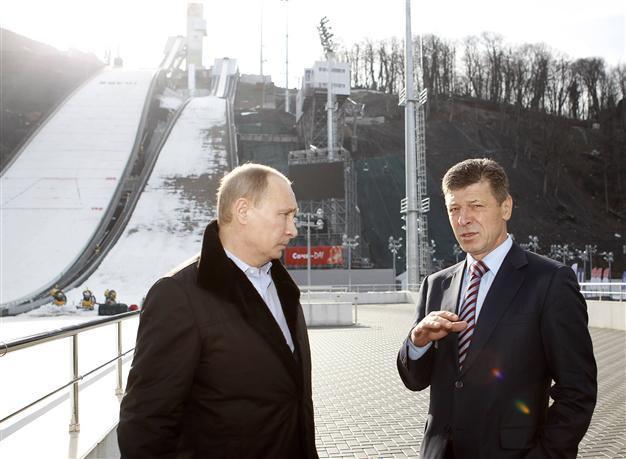EU targets politicians, military chiefs in sanctions on Russia
BRUSSELS – The Associated Press

Russia's President Vladimir Putin (L) listens to deputy Prime Minister Dmitry Kozak. REUTERS Photo
The European Union has released the names of 15 new targets of sanctions because of their roles in the Ukraine crisis.The list released Tuesday includes Gen. Valery Gerasimov, chief of the Russian General Staff, and Lt. Gen. Igor Sergun, identified as head of GRU, the Russian military intelligence agency.
Russian Deputy Prime Minister Dmitry Kozak and pro-Russian separatist leaders in Crimea and the eastern Ukrainian cities of Lugansk and Donetsk were also on the list.
The decision taken by the EU governments' ambassadors in Brussels brings the total number of Russians or pro-Russian individuals in Ukraine targeted by the EU's sanctions to 48.
The initial sanctions were adopted following Russia's annexation of Ukraine's Crimean Peninsula last month. The EU and the U.S. now also accuse Russia of destabilizing eastern Ukraine. NATO says Moscow has amassed some 40,000 troops just across the Ukrainian border and could invade the country within days if it wanted to.
The EU move comes after the U.S. decided to broaden its own sanctions to include seven Russian government officials and 17 companies with links to President Vladimir Putin.
EU to hold Russia, Ukraine gas talks on Friday in Warsaw
The European Union said talks with Russia and Ukraine over its gas supplies to the country and onward to Europe will take place Friday in the Polish capital Warsaw.
"This is a constructive step," European Commission spokeswoman Pia Ahrendkilde Hansen said, announcing the talks just one day after the EU hit another 15 Russian and Ukrainian figures with sanctions for their role in the crisis.
Russian President Vladimir Putin, who has threatened to cut gas shipments to Ukraine, had earlier proposed April 28 for talks in Moscow.
As the crisis deepened, Putin on April 10 sent a letter to 18 EU countries, many heavily dependent on Russian energy supplies, urging immediate negotiations.
He also warned that Moscow could cut gas supplies unless they helped Ukraine pay an outstanding $2.2-billion bill, threatening a repeat of 2009 when supplies to Europe which transit through Ukraine were badly disrupted.
Russia accounts for about a quarter of all EU gas supplies while Ukraine's pipelines carry about half of those imports each year, according to EU data.
In response to the crisis, EU leaders have stressed the need to reduce Europe's dependence on Russian supplies so as to reduce Moscow's leverage, especially in eastern Europe.
On Monday in a first step, Slovakia and Ukraine signed a deal to give Kiev access to European gas supplies.
"This is an important first step to diversify Ukraine's sources of gas supply and contributes to greater energy security in Eastern Europe and the EU as a whole," European Commission President Jose Manuel Barroso said at the signing in Bratislava.
"Signing today's deal is just a first step," Ukrainian Energy Minister Yuri Prodan added
















